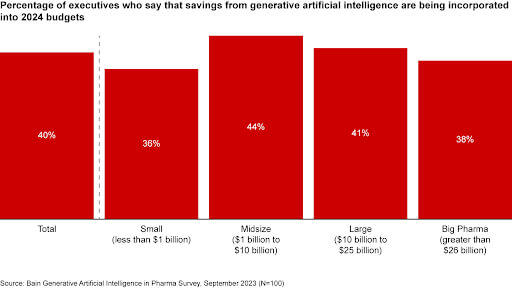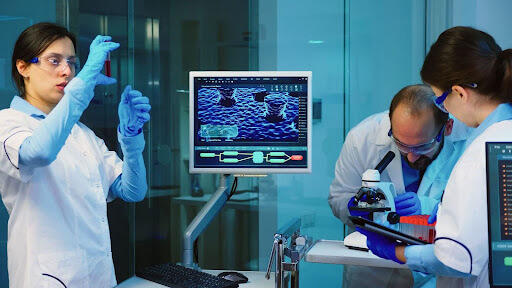 1-800-805-5783
1-800-805-5783 
The pharmaceutical industry is in the midst of a transformation driven by advances in artificial intelligence, particularly Generative AI. Traditionally, the journey of bringing a new drug to market can take an average of ten years and cost around $1.4 billion in out-of-pocket expenses, with approximately 80% of these costs tied to clinical development, according to researchers at the Tufts Center for the Study of Drug Development.
Generative AI offers a breakthrough in this process, promising to reduce these staggering costs and timeframes significantly. Research by Forbes suggests that integrating Generative AI into pharma could save up to $200 billion to $360 billion annually within the US healthcare system and improve employee productivity by enhancing working hours by 40%.
Generative AI is reshaping how drugs are discovered, developed, and tested, driving faster market entry and personalizing patient care. This blog will explore how Generative AI accelerates drug development and optimizes clinical trial designs to revolutionize the pharmaceutical landscape.
Generative AI refers to AI models capable of creating new data, such as images, text, or chemical structures, by learning patterns from existing data. Unlike traditional AI models that analyze data to make predictions or classifications, Generative AI creates new outputs.
Key technologies driving Generative AI include Generative Adversarial Networks (GANs) and Variational Autoencoders (VAEs). These are particularly useful in drug design because they can generate novel molecular structures that meet predefined criteria. Around 40%—60% of pharmaceutical companies estimate cost savings from generative AI in their 2024 budget planning.

Generative AI stands out in pharmaceuticals by exploring vast chemical spaces, rapidly suggesting innovative drug formulations, and optimizing the clinical trial process. This approach can lead to more precise, personalized treatments, significantly improving patient outcomes. The potential for personalized treatments offered by Generative AI is a reason for optimism about the future of healthcare, instilling a sense of hope and anticipation in the audience.

Generative AI is revolutionizing drug discovery by rapidly creating new drug formulations and molecular structures. Unlike traditional methods that rely on time-consuming, manual testing of compounds, AI models can analyze and predict the therapeutic potential of millions of chemical compounds in mere minutes. This approach allows researchers to explore vast chemical spaces that were previously inaccessible, identifying novel drug candidates that conventional techniques may have overlooked.
Companies such as Insilico Medicine and BenevolentAI are at the forefront of this innovation, leveraging AI to design molecules that can swiftly move from computer models to real-world applications. Insilico Medicine, for instance, has developed AI-generated molecules in just weeks—far faster than the years required by traditional research methods.
These AI-generated compounds undergo extensive computational evaluations for critical factors such as safety, efficacy, and potential interactions, streamlining the early-stage selection of promising drug candidates.

Generative AI creates new molecules and enhances drug screening by predicting how these compounds interact with biological targets. Through advanced simulations, AI models can forecast drug candidates’ effectiveness, binding affinity, and potential side effects, reducing reliance on costly and time-consuming laboratory experiments. This targeted approach ensures that only the most promising drugs advance to clinical trials, accelerating the development pipeline while minimizing risks.
Clinical trials are crucial yet expensive and time-intensive components of drug development. Generative AI is transforming this stage by automating the creation of clinical study reports and optimizing the submission process.
AI-driven tools can generate comprehensive initial drafts of these reports, achieving high levels of accuracy and reducing the time required to prepare documentation for regulatory review. This streamlining accelerates the path to regulatory approval, enabling faster market entry for new therapies.
Recruiting suitable patients is a significant challenge in clinical trials, often leading to delays and increased costs. Generative AI addresses this by analyzing extensive datasets, including electronic health records, genetic profiles, and patient demographics, to identify ideal trial candidates.
AI’s precision in patient matching expedites recruitment and enhances the data quality collected, as participants are more likely to meet the specific criteria needed for reliable outcomes. This targeted approach ensures trials are conducted efficiently, with diverse and well-suited populations, ultimately improving the success rate of clinical studies.

Generative AI models can predict clinical trial outcomes by simulating scenarios based on patient characteristics, treatment protocols, and historical data. These simulations allow researchers to refine trial designs before implementation, significantly reducing the risk of costly failures.
AI also supports adaptive trial designs, a dynamic process in which trial parameters can adjust in real-time based on ongoing results. This dynamic nature ensures that professionals are actively engaged in the process, enhancing the chances of favorable outcomes and allowing trials to be more responsive to emerging data.

Generative AI is revolutionizing pharmaceuticals by accelerating drug development, optimizing clinical trials, and personalizing patient care. Its potential to save billions of dollars and improve productivity is just the beginning.
However, to fully leverage these benefits, the industry must navigate challenges such as data privacy, cybersecurity, regulatory compliance, and the need for human oversight. As AI advances, it will redefine the future of drug development, bringing hope for faster, more effective treatments for patients worldwide.
[x]cube has been AI-native from the beginning, and we’ve been working with various versions of AI tech for over a decade. For example, we’ve been working with Bert and GPT’s developer interface even before the public release of ChatGPT.
One of our initiatives has significantly improved the OCR scan rate for a complex extraction project. We’ve also been using Gen AI for projects ranging from object recognition to prediction improvement and chat-based interfaces.
Interested in transforming your business with generative AI? Talk to our experts over a FREE consultation today!